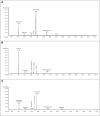Positive modulation of a new reconstructed human gut microbiota by Maitake extract helpfully boosts the intestinal environment in vitro
- PMID: 38603764
- PMCID: PMC11008829
- DOI: 10.1371/journal.pone.0301822
Positive modulation of a new reconstructed human gut microbiota by Maitake extract helpfully boosts the intestinal environment in vitro
Abstract
The human gut is a complex environment where the microbiota and its metabolites play a crucial role in the maintenance of a healthy state. The aim of the present work is the reconstruction of a new in vitro minimal human gut microbiota resembling the microbe-microbe networking comprising the principal phyla (Bacillota, Bacteroidota, Pseudomonadota, and Actinomycetota), to comprehend the intestinal ecosystem complexity. In the reductionist model, we mimicked the administration of Maitake extract as prebiotic and a probiotic formulation (three strains belonging to Lactobacillus and Bifidobacterium genera), evaluating the modulation of strain levels, the release of beneficial metabolites, and their health-promoting effects on human cell lines of the intestinal environment. The administration of Maitake and the selected probiotic strains generated a positive modulation of the in vitro bacterial community by qPCR analyses, evidencing the prominence of beneficial strains (Lactiplantibacillus plantarum and Bifidobacterium animalis subsp. lactis) after 48 hours. The bacterial community growths were associated with the production of metabolites over time through GC-MSD analyses such as lactate, butyrate, and propionate. Their effects on the host were evaluated on cell lines of the intestinal epithelium and the immune system, evidencing positive antioxidant (upregulation of SOD1 and NQO1 genes in HT-29 cell line) and anti-inflammatory effects (production of IL-10 from all the PBMCs). Therefore, the results highlighted a positive modulation induced by the synergic activities of probiotics and Maitake, inducing a tolerogenic microenvironment.
Copyright: © 2024 De Giani et al. This is an open access article distributed under the terms of the Creative Commons Attribution License, which permits unrestricted use, distribution, and reproduction in any medium, provided the original author and source are credited.
Conflict of interest statement
The authors have declared that no competing interests exist.
Figures







Similar articles
-
Human intestinal mucosa-associated Lactobacillus and Bifidobacterium strains with probiotic properties modulate IL-10, IL-6 and IL-12 gene expression in THP-1 cells.Benef Microbes. 2015;6(3):325-36. doi: 10.3920/BM2014.0081. Benef Microbes. 2015. PMID: 25391349
-
Prebiotic Effect of Maitake Extract on a Probiotic Consortium and Its Action after Microbial Fermentation on Colorectal Cell Lines.Foods. 2021 Oct 21;10(11):2536. doi: 10.3390/foods10112536. Foods. 2021. PMID: 34828817 Free PMC article.
-
Anti-inflammatory effect of multistrain probiotic formulation (L. rhamnosus, B. lactis, and B. longum).Nutrition. 2018 Sep;53:95-102. doi: 10.1016/j.nut.2018.02.005. Epub 2018 Feb 14. Nutrition. 2018. PMID: 29674267
-
Immunology and probiotic impact of the newborn and young children intestinal microflora.Anaerobe. 2011 Dec;17(6):369-74. doi: 10.1016/j.anaerobe.2011.03.010. Epub 2011 Apr 16. Anaerobe. 2011. PMID: 21515397 Review.
-
Probiotic Species in the Modulation of Gut Microbiota: An Overview.Biomed Res Int. 2018 May 8;2018:9478630. doi: 10.1155/2018/9478630. eCollection 2018. Biomed Res Int. 2018. PMID: 29854813 Free PMC article. Review.
Cited by
-
Beneficial Effects of In Vitro Reconstructed Human Gut Microbiota by Ginseng Extract Fermentation on Intestinal Cell Lines.Microorganisms. 2025 Jan 17;13(1):192. doi: 10.3390/microorganisms13010192. Microorganisms. 2025. PMID: 39858960 Free PMC article.
References
-
- von Martels JZH, Sadaghian Sadabad M, Bourgonje AR, Blokzijl T, Dijkstra G, Faber KN, et al.. The role of gut microbiota in health and disease: In vitro modeling of host-microbe interactions at the aerobe-anaerobe interphase of the human gut. Anaerobe 2017; 44:3–12. doi: 10.1016/j.anaerobe.2017.01.001 . - DOI - PubMed
MeSH terms
LinkOut - more resources
Full Text Sources
Miscellaneous

